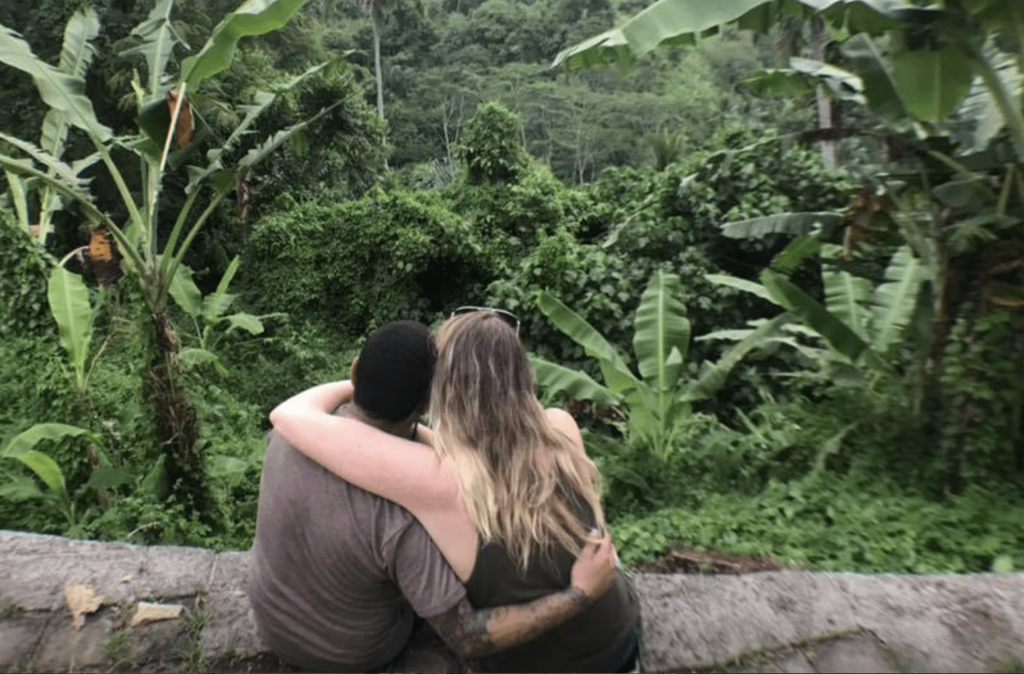When two American tourists got stranded in the jungle after an accident with their scooter, their only hope for rescue was a phone with a dying battery…and Facebook.
When Aimee Spevak spotted the Facebook notification from her friend Michael Lythcott, she happily let it distract her from work. She knew he was traveling in Bali, and she looked forward to checking out his posts.
But there were no smiling selfies against gorgeous tropical scenery this time. Only a red background with white alarming words: “Help. In danger. Call police.”
Mikey Lythcott, a 39-year-old graphic designer, was exploring Bali with his friend Stacey Eno, 25. The day after they landed, they rented a scooter outside of Ubud and drove into town, staying until well after midnight, meeting new people and having a great time.
It was after 2 a.m. when they retrieved their scooter and headed back to their hotel. Lythcott wedged his iPhone into a pouch to use as a navigation system. Motoring back, he glanced down to check his direction and when he looked up, they were going into an unexpected curve in the road. Lythcott tried to slow down, but it was too late.
(^The fateful curve, revisited a year later)
He woke up flat on his back in the middle of the jungle, and for a few minutes, he didn’t know what had happened or even where he was. Slowly, his thoughts came together until he finally remembered he was in Bali and had been riding on a scooter. But he didn’t recall the accident where he slammed the scooter into a tree and flew 150 feet down into a ravine.
Covered in blood, aching all over and unable to move his legs, he tried to call out for Stacey. Because both of his lungs were collapsed, he couldn’t speak very loudly, but she heard him anyway. She was close by. He dragged himself over to her. Neither of them could walk. No one could go for help, and in his terror, Lythcott found himself sliding down further into the ravine.
He found a tree root to hold onto and thought hard about how he needed to save them both. Still in a fog, he remembered he had a second phone in his pocket–one that allowed him to make calls to the U.S. He fumbled for it with one good hand and powered it on. At 42 percent power, he had enough to try for help, but he needed to hurry.
But who could he call? Where was he?
His Facebook app opened. With one hand slick with blood, and a tenuous grip on the tree root with his other hand, he created his bright-red call for help.
Spevak saw it two minutes after posting. She stared at it a moment wondering what to do. She had no idea where her friend was. Then, she remembered she could call him via Facebook.
Lythcott answered.
He told Spevak he was in the woods somewhere, but he didn’t know where. She told him to send her his location while she figured out who to call for help.
Using Facebook’s “pin drop” function, Lythcott sent Spevak GPS coordinates. She took a screenshot of it and posted it to the original post. Quickly, Lythcott’s well-traveled, but panicked friends responded.
One friend found all the police numbers in Bali by district and shared them. But, still no one could get through to them, or to Michael.
Meanwhile, Eno lay on the jungle floor in extreme pain. The bones of her face were shattered and her tongue had been sliced open. Lythcott called out to her that he was trying to raise help.
Josh Hofer sat at his computer staring at the pin-dropped location of his friend in horror and helplessness. Desperate for clues, he clicked on the image, and it opened with much greater detail than what others were seeing on their phones. He sent a screenshot of the image to the U.S. Consulate in Indonesia with a message begging for help.
Lythcott posted that he could hear water running. From his home in Los Angeles, Paul Rocha created a map from the coordinates and Lythcott’s hint, and posted it. Another of Lythcott’s friends, who lived in Prague, thought the location might be between a cooking school she knew of and a local bar. A more specific picture emerged. The stranded travelers were near Sweetwater Falls. Pictures of phone numbers to local authorities and the consulate flooded the thread. People began calling the numbers requesting help for Lythcott and Eno.
Christine Getzler-Vaughan, a public affairs officer at the U.S. Consulate General, started receiving the calls. Friends described the location and told her Lythcott and Eno were hurt and needed immediate medical attention. Faced with a barrage of details from Lythcott’s Facebook network, she was able to put together enough physical information to send a search and rescue party. It was 5:29 a.m., less than an hour after Lythcott reached out for help, when Getzler-Vaughan sent a text to him. “Someone from our office in Bali has the info your friends have sent us.”
Lythcott’s cell phone battery finally died. He and Eno drifted in and out of consciousness, alone and terrified of sliding the rest of the way down into the ravine to meet whatever slithered there.
Eventually, voices from a four-man search party emerged from the jungle. The rescuers carefully carried Lythcott and Eno to a flat-bed pickup.
Four hours after Lythcott’s Facebook plea, Caitlin posted an update. “HE IS OKAY AND IN THE HOSPITAL!”
After 8 days in the hospital for Eno, and a couple of weeks for Lythcott, both returned to their homes, a miracle having been performed thanks to Lythcott’s large circle of friends who wouldn’t let time or geography stop them from saving someone they loved.
Some people have friends who say they care. The lucky ones have friends who show it.






